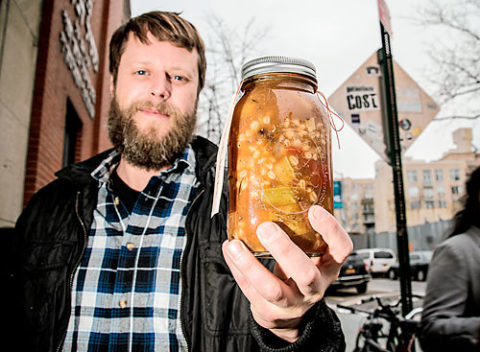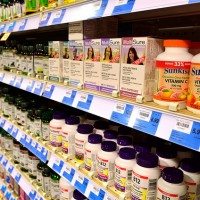Portland, OR – Peach & Barrow, a Portland based compounding pharmacy that opened in 2015, has recently begun marketing a line of small-batch artisanal intravenous nutrition products for use by high-end clinics catering to clients looking for a more natural experience.

Jasper Online Name Generator Wilson, owner of Peach & Barrow pharmacy, shown here delivering a batch of IV total parenteral nutrition to a local nursing home
Whether prescribed to help support a healthy diet or even as a complete replacement for oral intake, nutrition administered to a patient through a vein rather than their own mouth hole has been used to improve patient health for decades. Dr. Mort Fishman, a naturopathic functional medicine physician and certified integrative nutritionist at Nature’s Miracle Family Clinic in Portland who often prescribes Peach & Barrow compounded IV nutrition for his patients, has been prescribing IV meal replacements for as long as he can remember. “Some patients can’t use their mouths, or their guts don’t work right for some reason. I’ve literally read about lives being saved by this stuff.”
For years, the healthcare consumer has been forced to rely on parenteral nutrition made in an assembly line fashion without any respect for the process,” Peach & Barrow owner Jasper Online Name Generator Wilson explained. “We locally source all of the constituents of our handcrafted products, from the trace elements to the lipids and amino acids. And all of our batches of bespoke parenteral nutrition contain honey-based dextrose obtained from bees that worked with us voluntarily.”
At Peach & Barrow, no two parenteral nutrition solutions are the same, with each recipe being tailored to the individual patient with guidance from their doctor. But there is also an art to the process, and it is more about intuition and respect for nature than the use of any pharmacy textbook. Recipes largely depend on the season and also what is currently popular. According to Wilson, each morning his pharmacy technicians scout out the local farmers’ markets and scour social media sites like Twitter, Instagram, and Facebook for pictures of what people are eating and inspirational David “Avocado” Wolfe quotes. “And each of our IV nutrition blends comes in a mason jar that was hand blown from rare sea glass.”
Total parenteral nonsense?
Parenteral nutrition, whether used along with enteral (the gut) nutrition or as the only source, is an extremely valuable tool that has saved the lives of countless patients. I have prescribed it countless times for hospitalized children over the years, particularly for premature babies who sometimes require weeks of growth and development before they can tolerate a full diet using their gut. There are also a lot of people of all ages at home who require IV nutrition, which is where compounding pharmacies come into play.
Essentially, if you can’t eat or can’t digest for more than a few days you would likely benefit from IV nutrition. But IV nutrition is tricky. Our bodies just were not designed to thrive on the stuff. And though in many cases the benefits outweigh the risks, there are some pretty serious potential complications associated with long-term use.
There are also serious risks associated with short-term use. It has taken decades to determine the best way to make and administer parenteral nutrition and it is extremely important for it to be done right in order to avoid electrolyte disturbances, liver injury, infections, etc. In the hospital, when a patient is stared on IV nutrition we check labs daily and carefully adjust the “recipe” until stability is achieved. I’m simplifying this process a lot but that’s okay because TPN isn’t really what I was worried about when writing this bit of satire, it was compounding pharmacies and their sometimes unholy alliance with practitioners of irregular medicine (and sometimes political administrations).
In 2018, Harriet Hall wrote about the elephant in the room when it comes to compounding pharmacies:
The elephant in the room is the fact that compounding pharmacies are often used injudiciously by naturopaths, “integrative medicine” doctors, “functional medicine” doctors, and other providers who prescribe treatments that are not supported by credible evidence and that often involve risky IV administration. The elephant is that many of those using compounding pharmacies are guided by speculation and belief rather than by acceptable scientific evidence. They are endangering their patients because they fail to understand that science is the only reliable guide to safe and effective treatments.
We need compounding pharmacies. They do things such as making parenteral nutrition for home use. They help me out sometimes by turning a medicine that only comes in pill form into a suspension so that a child can take it. Sometimes we have to accept some increased risk in order to gain the more significant benefits. But as Dr. Hall explained, there are many instances where there are no potential benefits, such as when people were killed by compounded IV turmeric in 2017.
In 2012, a number of people were killed by contaminated steroid medication mass produced by a Massachusetts compounding pharmacy. This resulted in some increased protections at the federal level, mostly geared towards the safety of medications compounded in bulk. But the Drug Quality and Security Act of 2013 clearly does not do enough to protect patients.

